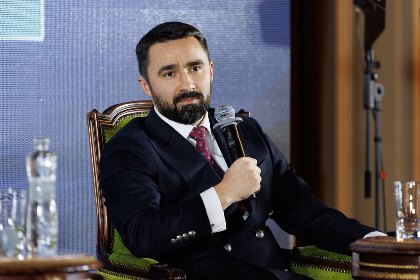Oleksandr Vodoviz, head of the CEO office at Ukrainian steelmaker Metinvest Group, has cautioned that the EU’s Carbon Border Adjustment Mechanism (CBAM), set to take effect on January 1, 2026, could deliver a major economic shock to Ukraine’s economy.
Speaking at the “On the Path of Integration: Dialogue between the Government and Business for Ukraine’s EU Membership” conference in Kyiv, Mr. Vodoviz said EU decarbonization policy has shifted from environmental protection to market protection, warning that it risks undermining Ukraine’s post-war industrial recovery.
Research conducted by UK-based auditing and consulting company Ernst & Young and the Federation of Employers of Ukraine estimates that CBAM could reduce Ukraine’s GDP by up to five percent in 2026 and by as much as 10 percent by 2030 if implemented as planned.

Appeal for postponement and alternative solutions
Vodoviz called on the Ukrainian government and the EU to explore options for deferring CBAM obligations or providing alternative compliance pathways until the war ends. “We appeal to the government: this is a serious blow to our economy. We need to jointly look for a solution, how to postpone this period, because there is a war in the country. Or what alternative commitments can we make to the European Union to avoid introducing the tax from January 1,” Vodoviz said.
He noted that, while EU steelmakers receive billions in grants to decarbonize and comply with environmental standards, Ukrainian producers lack comparable support due to wartime fiscal constraints and limited access to green financing.
“How can we compete with them? We do not have such opportunities. Therefore, we ask for a postponement of at least five years from the date of introduction of the CBAM and sincerely hope that it will be achieved,” he added.
Unequal playing field in green transition
The Metinvest executive highlighted that the EU’s decarbonization model is not yet compatible with Ukraine’s economic realities. European mills benefit from subsidies and carbon allowances, while Ukrainian exporters must bear CBAM costs directly, threatening competitiveness in their largest export market.
However, without corresponding domestic carbon pricing or compensation mechanisms, Ukrainian steel exports to the EU could become uncompetitive overnight, further straining industrial production and employment.
ETS integration and transparency concerns
Vodoviz urged the government to establish a transparent, market-based carbon emissions trading system (ETS) similar to the EU’s, rather than a centralized carbon payment fund. He warned that a state-managed fund for collecting and redistributing carbon revenues could create risks of inefficiency and opacity.
Instead, he advocated integration with the EU ETS, ensuring that emissions payments are recycled back into companies through support for decarbonization projects and clean technologies.